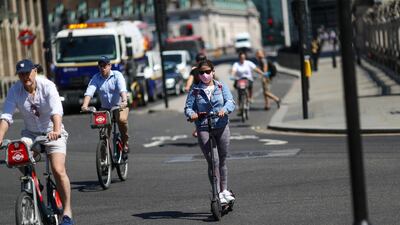As it launched a series of localised rental electric scooter trials, the British government has issued a checklist of rules of the road for riders.
Among the plethora of restrictions are detailed warnings on the dos and don'ts. Nothing should be towed and no phones or navigation devices like Strada are permitted. A helmet should be worn. The government also advises riders to wear light-coloured or fluorescent clothing.
Despite growing popularity the use of e-scooters is currently prohibited on public roads, pavements and cycle lanes in the UK, but there is an amnesty on enforcement while trials are carried out.
E-scooter advocates say they will help to reduce congestion and pollution in major cities, whereas opponents contend that they present a safety hazard and offer limited health benefits.
With the global e-scooter market expected to peak at £20 billion ($27 billion) in 2020, the e-scooting dissenters seem destined to be on the losing side of the argument.
Where can I use an electric scooter in the trials?
The UK government has been slow to regulate but the trials are an acknowledgement of the inexorable direction of two-wheeled travel.
Since July 4, cities have been able to apply to trial e-scooters which have a maximum speed of 15.5mph on roads, cycle lanes and tracks - although pavement usage is still banned.
This chart shows the areas where UK trials are currently taking place:
Do I need a driving licence and registration plate?
In order to participate in the trials, scooterers must have a category Q entitlement on their driving licence which permits them to drive two and three-wheeled vehicles without pedals, so long as the engine size does not exceed 50cc.
A full or provisional UK licence for categories AM, A or B includes a Q entitlement, and even if your licence is provisional, you don’t have to show L plates when on an e-scooter.
For those with EU or European Economic Area licences, usage is allowed if the licence doesn’t prevent you from driving low-speed mopeds and motorcycles. The same applies to those with a licence from farther afield, so long as they entered the country within the last 12 months.
Registration plates are not required as part of the trials.
Do I need insurance and have to pay vehicle excise duty to ride an electric scooter?
E-scooters must have motor insurance but it is arranged through the e-scooter rental provider. There is no need to pay vehicle excise duty.
What should I wear on an electric scooter?
The government advises users to wear helmets when on an e-scooter but this is not mandatory.
If a helmet is worn, it should conform to current regulations and be both the correct size and
securely fastened.

What are the other safety rules for electric scooters?
E-scooters must only be used within the locale hosting the trial and only by one person at a time.
Bags can be transported but must be done so safely and never hung from the handlebars.
And the same drink driving laws that apply to cars and other motorised vehicles also apply to e-scooters.

